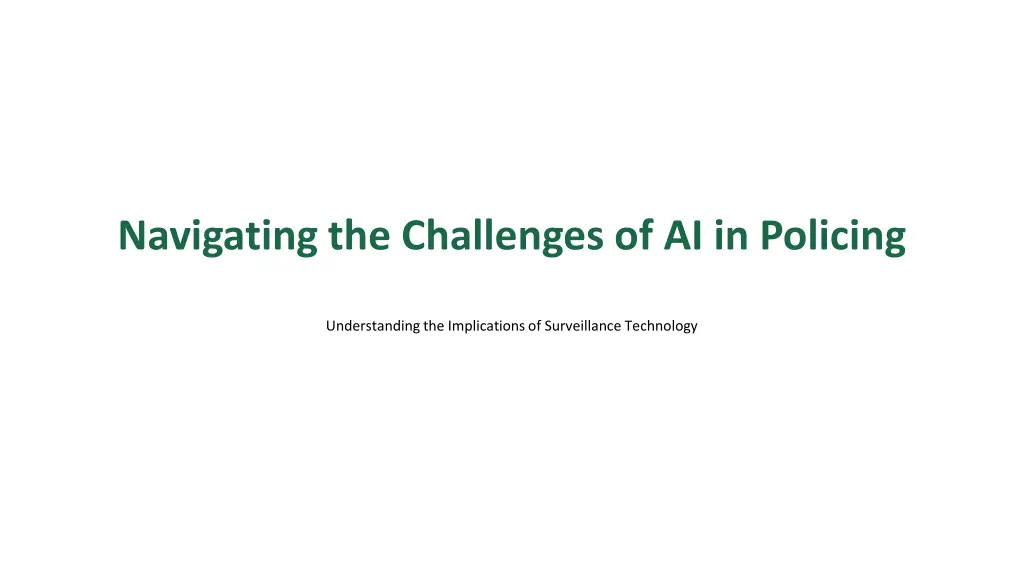
Challenges of AI in Policing: Understanding Surveillance Technology Implications
"Explore the impact of AI technologies in law enforcement, from biased algorithms to legal challenges and reputational damage. Addressing these issues is crucial for ethical AI implementation in policing."
Download Presentation

Please find below an Image/Link to download the presentation.
The content on the website is provided AS IS for your information and personal use only. It may not be sold, licensed, or shared on other websites without obtaining consent from the author. If you encounter any issues during the download, it is possible that the publisher has removed the file from their server.
You are allowed to download the files provided on this website for personal or commercial use, subject to the condition that they are used lawfully. All files are the property of their respective owners.
The content on the website is provided AS IS for your information and personal use only. It may not be sold, licensed, or shared on other websites without obtaining consent from the author.
E N D
Presentation Transcript
Navigating the Challenges of AI in Policing Understanding the Implications of Surveillance Technology
01 The Rise of AI in Policing Table of Contents 02 Biased Algorithms and Minority Targeting 03 The Legal Landscape of AI Policing 04 Reputational Damage from AI Misuse 05 The Human Element in Policing 06 Community Engagement and Transparency 07 Global Perspectives on AI Policing 08 The Role of Policy and Regulation 09 Looking Forward: Ethical AI in Policing 10 Thank You for Engaging in This Discussion
1 The Rise of AI in Policing In recent years, AI technologies have increasingly been integrated into law enforcement, promising enhanced efficiency and predictive capabilities. These advancements aim to streamline policing efforts, but they also introduce significant ethical concerns. Policing practices now leverage vast amounts of data to forecast crimes, but this reliance on technology warrants careful scrutiny. As we explore this topic, we must consider the consequences of AI-powered surveillance and its societal impact. Understanding this dynamic will prepare us for the discussions ahead.
2 Biased Algorithms and Minority Targeting One of the most pressing issues with AI policing is the potential for biased algorithms. These algorithms often reflect societal biases present in historical data, disproportionately affecting minority communities. This targeting can lead to wrongful arrests, damaging communities and eroding trust in law enforcement. Addressing algorithmic bias must be a priority as it impacts the very fabric of our society. Awareness and action are crucial in combatting this trend.
3 The Legal Landscape of AI Policing The integration of AI in policing raises numerous legal challenges and questions. As litigations increase, police departments find themselves navigatinga complex web of civil rights concerns. These legal consequences stem primarily from the misuse of AI technologies and the resulting harmful impacts on individuals. Understanding this legal landscape is essential for both law enforcementand the communities they serve. An informed approachcan help mitigate potentialrisks.
4 Reputational Damage from AI Misuse In addition to legal ramifications, AI-driven policing can lead to significant reputational damage for law enforcement agencies. Communities affected by biased policing efforts may lose confidence in those sworn to protect them. This erosion of public trust can hinder law enforcement's effectiveness and community cooperation. Consequently, it is critical for agencies to address these issues proactively. Reputation management must be part of the AI implementation strategy.
5 The Human Element in Policing While technology can enhance policing, the human element cannot be overlooked. Training officers to understandand mitigate bias in AI tools is vital for effective policing. Human oversight in AI decisions ensures that policing remains fair and just. Integrating empathy and understanding in law enforcement practices can offset some technological drawbacks. Policing should always prioritize humanity, regardless of technological advancement.
6 Community Engagement and Transparency Building trust within communities requires transparency about AI usage in policing. Engaging with community members fosters dialogue about concerns and expectations surrounding surveillance. Communities that feel included in the conversation are more likely to support law enforcement efforts. Transparency serves as a foundation for accountability in the age of AI-enhanced policing. Collaboration between law enforcement and communities is essential.
7 Global Perspectives on AI Policing AI-driven policing is not only a local issue; it is a global concern. Various countries have experienced differentoutcomes based on their approachto AI ethics and regulation. Learning from international case studies can provide valuable insights into best practices. Collaborative efforts may lead to more effective solutions across borders. Together, we can create standards that uphold human rights and dignity.
8 The Role of Policy and Regulation Effective policy and regulation play a crucial role in managing AI in law enforcement. Governments must establish guidelines to ensure responsible AI usage in policing practices. Regulations should prioritize civil rights and prevent abuses stemming from technological overreach. A proactive regulatory framework can help mitigate potential harms while promoting innovation. Policy leadership is vital for a balanced approachto AI in policing.
9 Looking Forward: Ethical AI in Policing As we stand at the crossroads of technology and law enforcement, the concept of ethical AI must guide our path forward. Stakeholders must collaborate to develop AI systems that prioritize fairness, accountability, and transparency. Creating robust ethical guidelines will ensure that AI serves to enhance, rather than undermine, societal trust. The future of policing should reflect our collective values and commitment to justice. Together, we can reshape the narrative aroundAI in law enforcement.
10 Thank You for Engaging in This Discussion I appreciate your attention and engagement throughoutthis presentation. The conversation surrounding AI and policing is important for our shared future. Let's continue to advocate for ethical practices and community trust in law enforcement. Your insights and voices are vital in shaping an informed response to these challenges. Thank you once again for your participation!
